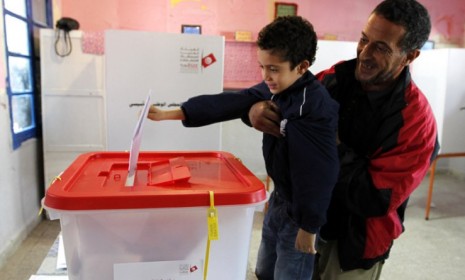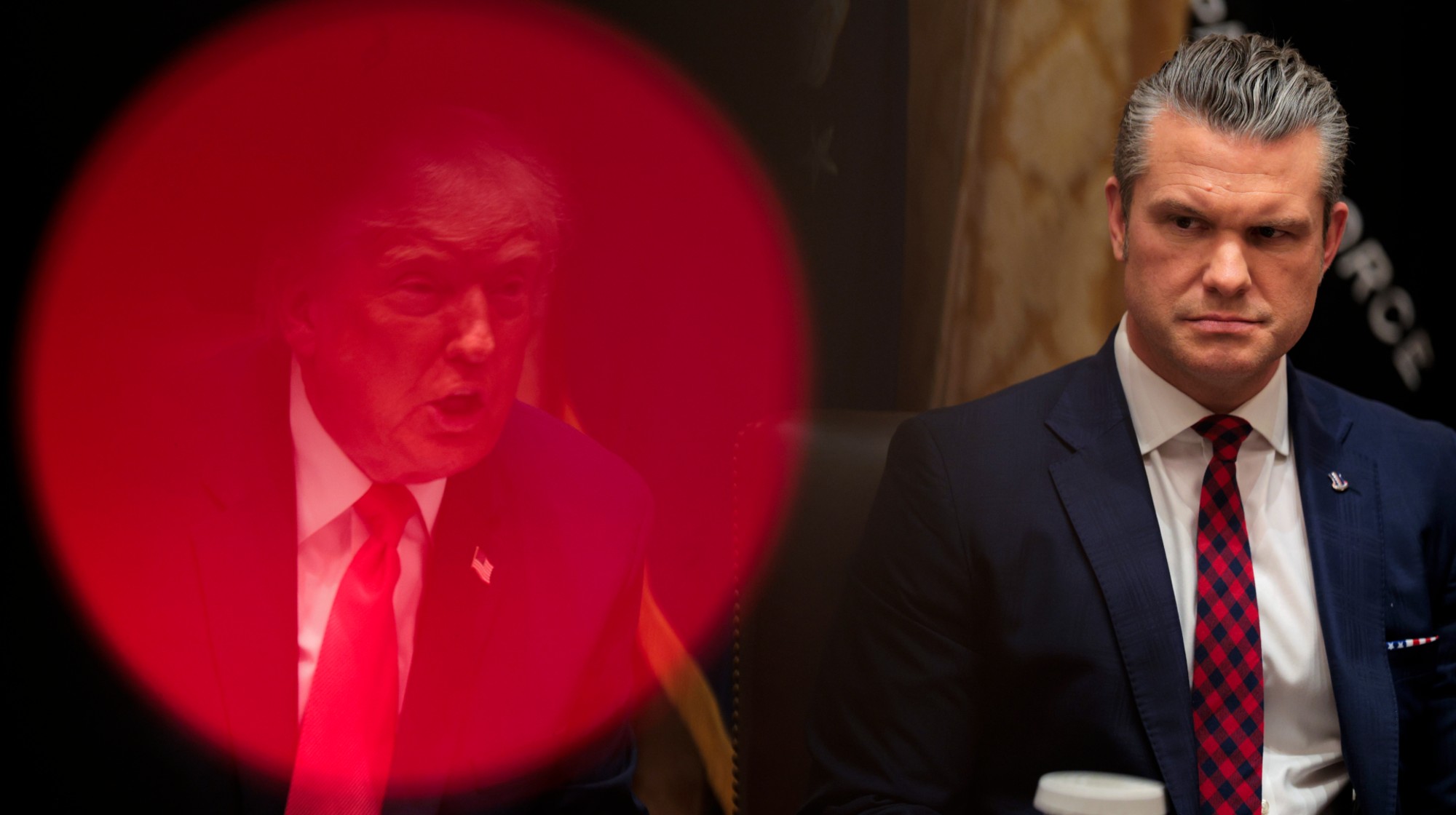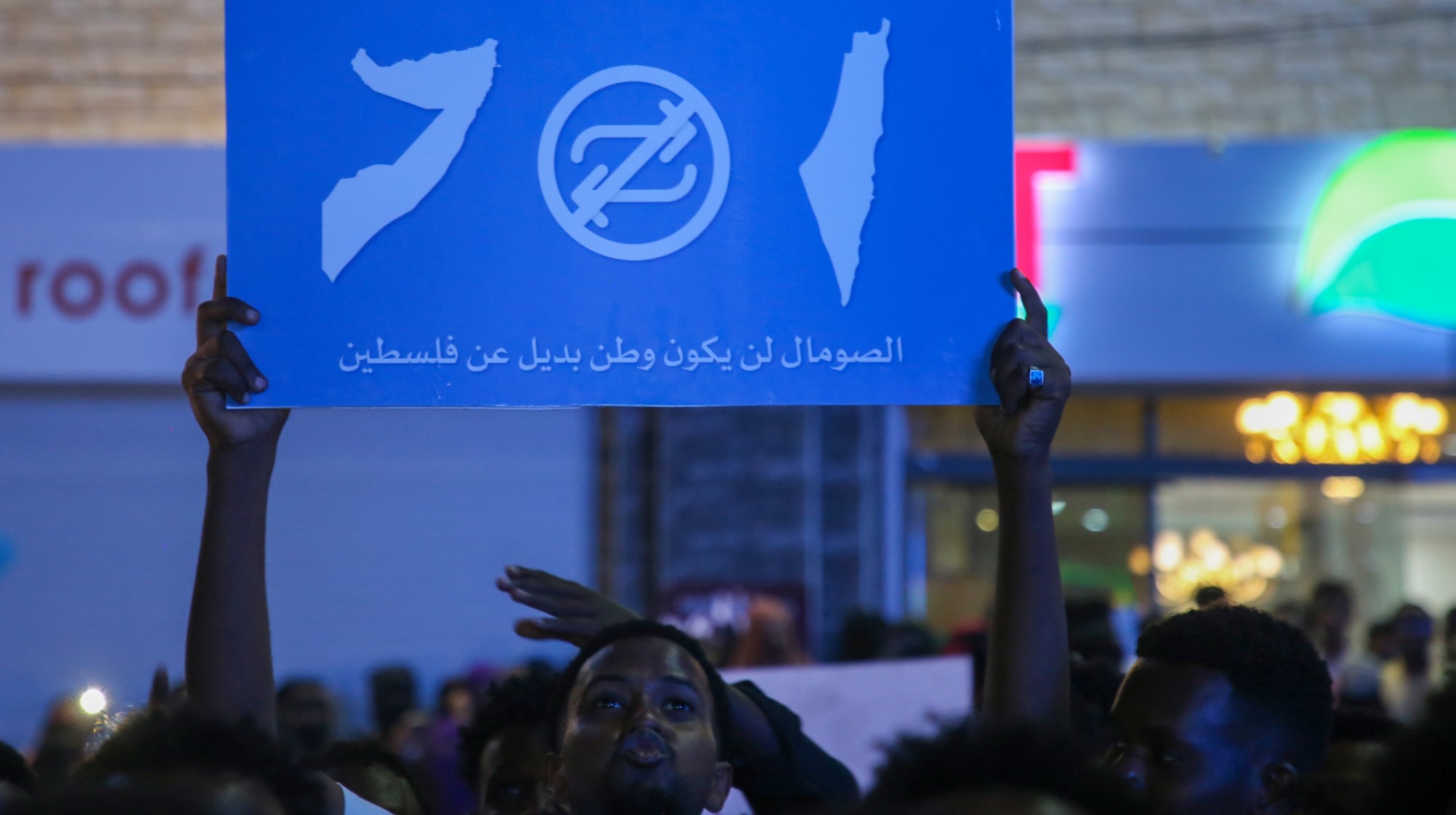Tunisia's 'historic' election: 4 lessons
Moderate Islamists appear to be the big winner in historically secular Tunisia's first free elections. Is this a Pyrrhic victory for democracy?

Ten months after Tunisian street vendor Mohammed Bouazizi burned himself to death as a political protest — and set off a chain of events that led to the Arab Spring — more than 90 percent of Tunisian voters turned out this weekend for the country's first free and democratic election. Official results won't be released until Tuesday, but the biggest winner in the election for a 217-member assembly charged with writing a new constitution is expected to be the moderate Islamist party Ennahda, long banned under deposed President Zine El-Abidine Ben Ali. What can we learn from what United Nations Secretary General Ban Ki-moon hailed as a "historic" and "landmark election"? Here, four lessons:
1. Arab countries can do democracy
The Tunisian people's giddy embrace of voting "makes the apathy often prevalent in established democracies seem shameful," says Issandr El Amrani at Britain's Guardian. This surprisingly well-run and transparent election "offers a symbol of hope" to other Arab Spring nations, and to skeptical observers who didn't think the uprisings would usher in democracy. There are plenty of hopeful signs that the era of the privileged Arab leader is over, says Lebanon's The Daily Star in an editorial. When Ennahda boss Rachid Ghannouchi tried to jump the queue to vote, he "was firmly told by the public to get in line."
The Week
Escape your echo chamber. Get the facts behind the news, plus analysis from multiple perspectives.

Sign up for The Week's Free Newsletters
From our morning news briefing to a weekly Good News Newsletter, get the best of The Week delivered directly to your inbox.
From our morning news briefing to a weekly Good News Newsletter, get the best of The Week delivered directly to your inbox.
2. But when Arabs vote, they choose Islamists
The victory of "so-called 'moderate' Islamists'" is a troubling sign for Tunisia, but it's "likely to be repeated in several Arab countries partaking in the 'Arab Spring,'" says Rick Moran at American Thinker. Sure, Ennahda isn't al Qaeda, but Ghannouchi may still drive "Tunisian society toward Islamification." This is especially worrisome because Tunisia is "arguably the Arab world’s most secular state," says Oren Kessler at The Jerusalem Post. So if an Islamist "wolf in sheep's clothing" like Ennahda can win there, there's little hope for secular democracy elsewhere.
3. Voting for Islamists isn't necessarily a bad thing
"The West views the emergence of the Islamists as the unintended, unpleasant consequence of the Arab Spring," says Arab News in an editorial. But part of democracy is trusting the wisdom of the voters, and "whoever gets people's mandate, they deserve a fair chance to prove themselves." Ennahda takes Turkey's moderate Islamist government as its model, and if the Tunisian party oversteps its mandate and quashes newly won freedoms, "the people who threw out their tormentors recently are unlikely to tolerate the same, old cynical game all over again."
A free daily email with the biggest news stories of the day – and the best features from TheWeek.com
4. Tunisia is very different than Egypt and Libya
With its educated populace, large middle class, strong history of women's rights, and "amazing Mediterranean mosaic of cultures," says Trudy Rubin in The Philadelphia Inquirer, "Tunisia has a chance to become the first real Arab democracy." But that means its success may not be replicable. "Tunisia is on the periphery of the Arab world, so it remains to be seen what effect free elections here will have on other Arab countries like Egypt," says Issandr El Amrani, quoted in The Christian Science Monitor.
-
 Why is Trump’s alleged strike on Venezuela shrouded in so much secrecy?
Why is Trump’s alleged strike on Venezuela shrouded in so much secrecy?TODAY'S BIG QUESTION Trump’s comments have raised more questions than answers about what his administration is doing in the Southern Hemisphere
-
 Vance’s ‘next move will reveal whether the conservative movement can move past Trump’
Vance’s ‘next move will reveal whether the conservative movement can move past Trump’Instant Opinion Opinion, comment and editorials of the day
-
 Why recognizing Somaliland is so risky for Israel
Why recognizing Somaliland is so risky for IsraelTHE EXPLAINER By wading into one of North Africa’s most fraught political schisms, the Netanyahu government risks further international isolation
-
 Bari Weiss’ ‘60 Minutes’ scandal is about more than one report
Bari Weiss’ ‘60 Minutes’ scandal is about more than one reportIN THE SPOTLIGHT By blocking an approved segment on a controversial prison holding US deportees in El Salvador, the editor-in-chief of CBS News has become the main story
-
 Has Zohran Mamdani shown the Democrats how to win again?
Has Zohran Mamdani shown the Democrats how to win again?Today’s Big Question New York City mayoral election touted as victory for left-wing populists but moderate centrist wins elsewhere present more complex path for Democratic Party
-
 Millions turn out for anti-Trump ‘No Kings’ rallies
Millions turn out for anti-Trump ‘No Kings’ ralliesSpeed Read An estimated 7 million people participated, 2 million more than at the first ‘No Kings’ protest in June
-
 Ghislaine Maxwell: angling for a Trump pardon
Ghislaine Maxwell: angling for a Trump pardonTalking Point Convicted sex trafficker's testimony could shed new light on president's links to Jeffrey Epstein
-
 The last words and final moments of 40 presidents
The last words and final moments of 40 presidentsThe Explainer Some are eloquent quotes worthy of the holders of the highest office in the nation, and others... aren't
-
 The JFK files: the truth at last?
The JFK files: the truth at last?In The Spotlight More than 64,000 previously classified documents relating the 1963 assassination of John F. Kennedy have been released by the Trump administration
-
 'Seriously, not literally': how should the world take Donald Trump?
'Seriously, not literally': how should the world take Donald Trump?Today's big question White House rhetoric and reality look likely to become increasingly blurred
-
 Will Trump's 'madman' strategy pay off?
Will Trump's 'madman' strategy pay off?Today's Big Question Incoming US president likes to seem unpredictable but, this time round, world leaders could be wise to his playbook